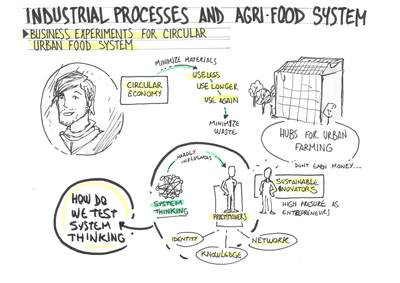Business experiments for circular urban food systems
Konietzko, Jan, Bocken, Nancy and Hultink, Erik Jan (2018) Business experiments for circular urban food systems. In: Proceedings of RSD7, Relating Systems Thinking and Design 7, 23-26 Oct 2018, Turin, Italy.
Preview |
Text
Konietzko_Slides_2018.pdf Download (11MB) | Preview |
![Konietzko_Industrial_2018.jpg [thumbnail of Konietzko_Industrial_2018.jpg]](https://openresearch.ocadu.ca/2696/2.hassmallThumbnailVersion/Konietzko_Industrial_2018.jpg)  Preview |
Image
Konietzko_Industrial_2018.jpg Download (327kB) | Preview |
Abstract
The food sector causes around 30% of global life cycle environmental impacts, mostly due to dairy and meat production and consumption. These impacts can be reduced through systemic innovation in how people relate to food, and consequently how and what they choose to eat (Tukker et al. 2011). New businesses are emerging that address sustainable food challenges, to reduce waste, water, energy use, and carbon emissions associated with food.
‘The New Farm’ is a recently established food innovation hub in the city of The Hague that has hosted a number of these emerging businesses. Examples include: Urban Farmers, a large aquaponics farm for circular vegetable and fish production; Haagse Zwam, which uses waste from coffee grounds to grow oyster mushrooms; UpTown Greens, which provides vertical farm units to restaurants. The New Farm is located in a low-income district and seeks to involve the local neighborhood as a focus use case. The hub is loca- ted in an old, refurbished industrial building. At the point of writing, it is at the beginning of its operations, with last constructions to create space for multiple restaurants to settle in the ground floor of the building. We seek to answer the following question: How can a local innovation hub serve to engage organisations in joint business experiments to design circular urban food systems?
This question is based on two insights from the field of sustainable inno- vation. First, any innovation activity for sustainability needs to look at multiple levels (e.g. products, business models and systems), with special attention to systemic levels (Ceschin and Gaziulusoy 2016). This is because sustainability problems can only be addressed through the connections and interactions between, for example, people, organisations, products and ser- vices (Meadows 1997; Boulton et al. 2015). The circular economy provides a useful narrative for such systemic innovation (Blomsma and Brennan 2017). It suggests that organisations jointly minimise a system’s resource inputs, as well as its waste and emission outputs. This can be done by narrowing (use less), slowing (use longer) and closing (use again) resource loops (Geissdoerfer et al. 2017). Second, while a lot research has been about ‘what’ is necessary (e.g. minimise negative environmental impacts), and ‘why’ (e.g. safeguarding welfare for coming generations), less is known about ‘how’ effective change can be created (Zollo et al. 2013). Conducting business experiments has been promoted as an actionable process for ‘how’ this can be done for circular economy (Bocken et al. 2016; Bocken et al. 2018). It works as follows: come up with new ideas, select the ‘best’ idea, and then get out of the building as quickly as possible to test critical assumptions about its desirability, viability and fea- sibility at the lowest possible cost and the least amount of time. Key here is to rapidly go through ‘build-measure- learn’ cycles to learn whether an idea works or not, and iterate or pivot after each cycle (Ries 2011; Osterwalder et al. 2014).
Conducting business experiments on a systems level requires a few additio- nal considerations. First, they require open project structures and time to de- velop a shared vision among involved people and organisations (Konietzko et al. 2018). Second, they ideally focus on one location, one use case and one initial customer, while they also test the adaptability of value propositions to other contexts (e.g. other customers, locations, and use cases) (ibid.).
The hub is a purposed case that can enable systemic and collaborative bu- siness experiments. It focuses on one location and one use case. However, the tenants in the hub have not yet established a project structure for joint experiments or a shared vision. This is the starting point for our research. We use four steps to explore the question: 1) 10 interviews with tenants and partners, 2) informal get-togethers between tenants, 3) business experiment design, 4) business experiment sprints with tenants. First interviews have revealed individual interests and the willingness for joint action. First infor- mal get-togethers have helped identify common interests. Going forward, we seek to integrate this with a method for workshops to create a shared vision and conduct business experiments together with the tenants to an- swer the question.
| Item Type: | Conference/Workshop Item (Paper) |
|---|---|
| Uncontrolled Keywords: | Circular economy, Business experiments, Urban food systems |
| Related URLs: | |
| Date Deposited: | 20 Jun 2019 20:51 |
| Last Modified: | 20 Dec 2021 16:16 |
| URI: | https://openresearch.ocadu.ca/id/eprint/2696 |
Actions (login required)
 |
Edit View |

 Lists
Lists Lists
Lists